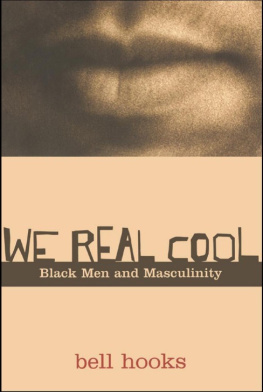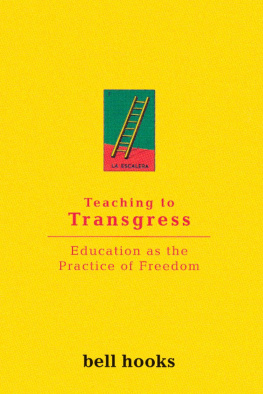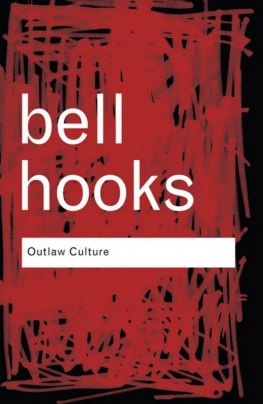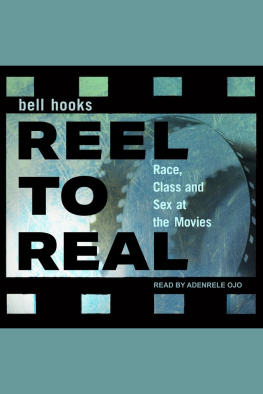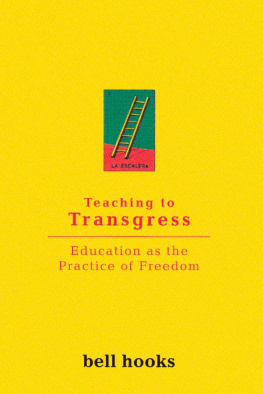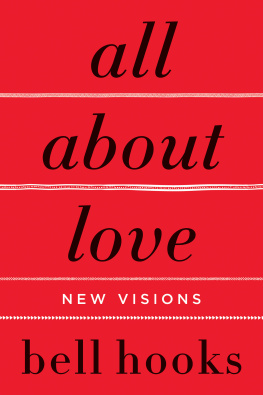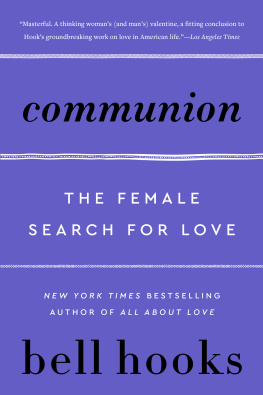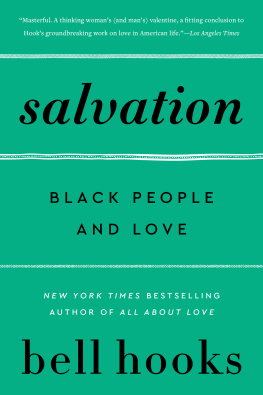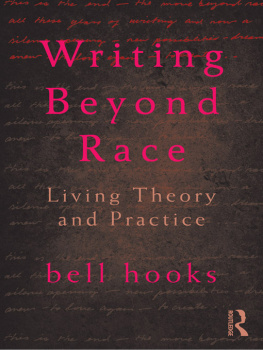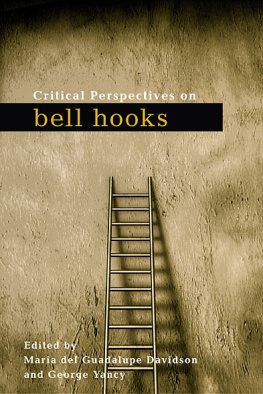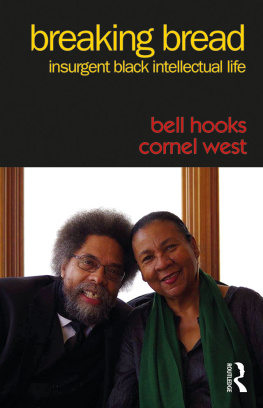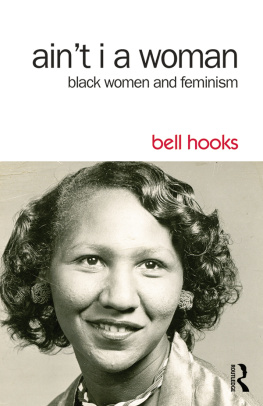bell hooks - We Real Cool: Black Men and Musculinity
Here you can read online bell hooks - We Real Cool: Black Men and Musculinity full text of the book (entire story) in english for free. Download pdf and epub, get meaning, cover and reviews about this ebook. genre: Politics. Description of the work, (preface) as well as reviews are available. Best literature library LitArk.com created for fans of good reading and offers a wide selection of genres:
Romance novel
Science fiction
Adventure
Detective
Science
History
Home and family
Prose
Art
Politics
Computer
Non-fiction
Religion
Business
Children
Humor
Choose a favorite category and find really read worthwhile books. Enjoy immersion in the world of imagination, feel the emotions of the characters or learn something new for yourself, make an fascinating discovery.
- Book:We Real Cool: Black Men and Musculinity
- Author:
- Genre:
- Rating:4 / 5
- Favourites:Add to favourites
- Your mark:
- 80
- 1
- 2
- 3
- 4
- 5
We Real Cool: Black Men and Musculinity: summary, description and annotation
We offer to read an annotation, description, summary or preface (depends on what the author of the book "We Real Cool: Black Men and Musculinity" wrote himself). If you haven't found the necessary information about the book — write in the comments, we will try to find it.
We Real Cool: Black Men and Musculinity — read online for free the complete book (whole text) full work
Below is the text of the book, divided by pages. System saving the place of the last page read, allows you to conveniently read the book "We Real Cool: Black Men and Musculinity" online for free, without having to search again every time where you left off. Put a bookmark, and you can go to the page where you finished reading at any time.
Font size:
Interval:
Bookmark:
WE REAL COOL
WE REAL COOL
Black Men and Masculinity
bell hooks
Routledge
New York and London
Published in 2004 by
Routledge
29 West 35th Street
New York, NY 10001
www.routledge-ny.com
Published in Great Britain by
Routledge
11 New Fetter Lane
London EC4P 4EE
www.routledge.co.uk
Routledge is an imprint of the Taylor & Francis Group.
This edition published in the Taylor & Francis e-Library, 2005.
To purchase your own copy of this or any of Taylor & Francis or Routledges collection of thousands of eBooks please go to www.eBookstore.tandf.co.uk.
2004 by Gloria Watkins
All rights reserved.
No part of this book may be reprinted or reproduced or utilized in any form or by any electronic, mechanical or other means, now known or hereafter invented, including photocopying and recording or in any information storage or retrieval system, without permission in writing from the publishers.
LIBRARY OF CONGRESS CATALOGING-IN-PUBLICATION DATA
hooks, bell.
We real cool: Black men and masculinity/bell hooks.
p. cm.
Includes index.
ISBN 0-415-96926-3 (HB: alk. paper)
ISBN 0-415-96927-1 (pbk.: alk. paper)
1. African American menSocial conditions.2. African American menSocial life and customs.3. African American menPsychology.4. MasculinityUnited States.5. Sex roleUnited States.6. United StatesRace relations.I. Title.
E185.86.H74172003
305.38'896073-dc222003016951
ISBN 0-203-64220-1 Master e-book
ISBN 0-203-67669-6 (Adobe eReader Format)
i was not meant to be alone and without
you who understand
about black men: dont believe the hype
plantation patriarchy
gangsta culture: a piece of the action
schooling black males
dont make me hurt you: black male violence
its a dick thing: beyond sexual acting out
from, angry boys to angry men
waiting for daddy to come home: black male parenting
doing the work of love
healing the hurt
the coolness of being real
dont believe the hype
When women get together and talk about men, the news is almost always bad news. If the topic gets specific and the focus is on black men the news is even worse. Despite all the advances in civil rights in our nation, feminist movement, sexual liberation, when the spotlight is on black males the message is usually that they have managed to stay stuck, that as a group they have not evolved with the times. Influential black male journalist Ellis Cose does little to dispel this image of black masculinity in his recent book The Envy of the World: On Being a Black Man in America. Yet his book has received more widespread attention than any other recent work focusing on black males.
Identifying black males as a group apart in the preface Cose contends:
Many of us are lost in this America of the twenty-first century. We are less sure of our place in the world than our predecessors, in part because our options, our potential choices, are so much grander than theirs. So we are trapped in a paradox. We know, whether we admit it openly or not, that in many respects things are better than they have ever been for us. This is a time, after all, when an African American [male] can be secretary of state and, possibly, even president. The old barriers that blocked us at every pass have finally fallen awayor they have opened up enough to allow a few of us to get through. But although it is fully within our power, collectively and individually, to achieve a level of success that would have been all but unimaginable for most of our forefathers, many of us are doomed to fail.While Cose eloquently identifies many of the issues, he offers no vision of how black males might create new and different self-concepts.
The final chapter, titled Twelve Things You Must Know to Survive and Thrive in America, offers his new world rules, his keys to survival, or Coses commandments, or if you prefer hard truths of this new age. His hard truths are at best simple commonsense advice about how to get along in the world and at worst trite platitudes. He encourages black men to stop complaining, stop blaming others for their plight, to ask for help, and to stay away from toxic associates. Hard Truth 11 states even if you have to fake it, show some faith in yourself. Cose concludes his book with this disclaimer: This volume is purposely less concerned with the systemic, with the grand social changes needed, than it is with the personal, with some things you might want to consider as you figure out how to live your life. The Envy of the World is a disappointing cultural analysis of the plight of black males precisely because Cose fails to link the personal, everything that is happening in the daily lives of black males, with the political, with progressive movements for social justice that offer theoretical and practical strategies that could be used to enhance the emotional well-being of black males and increase their chances of living fully and well.
Despite his direct appeal to black males in his last chapter, the language of Coses book is that of the dispassionate observer. The book offers the kind of sketchy overview of black maleness that suggests its audiences are readers who simply do not have a clue about the experiences of black men. Even his chosen title, taken from the novel Sula by Toni Morrison, implies an audience of non-black males looking through the lens of their envy. Coses book certainly lets them know that they have nothing to envy. In the novel a black woman is chastising a black male for suggesting that he is not getting enough attention. She says:
I mean, I dont know what the fuss is about. I mean, everything in the world love you. White men love you. They spend so much time worrying about your penis they forget their own. And white women? They chase you all to every corner of the earth, feel for you under every bed. Colored women worry themselves into bad health just trying to hang on to your cuffs. Even little children, white and black, boys and girlsspend all their childhood eating their hearts out 'cause you dont love them. And if that aint enough, you love yourselves. Nothing in the world loves a black man more than another black man. It looks to me like you the envy of the world.Though seductive in its use of the word love, close analysis shows that what is really being described is not love but desire. Perhaps what complaining black males want the world to hear is that envy and desire are not aspects of love.
Sadly, the real truth, which is a taboo to speak, is that this is a culture that does not love black males, that they are not loved by white men, white women, black women, or girls and boys. And that especially most black men do not love themselves. How could they, how could they be expected to love surrounded by so much envy, desire, hate? Black males in the culture of imperialist white-supremacist capitalist patriarchy are feared but they are not loved. Of course part of the brainwashing that takes place in a culture of domination is the confusion of the two. Thriving on sadomasochist bonds, cultures of domination make desire for that which is despised take on the appearance of care, of love. If black males were loved they could hope for more than a life locked down, caged, confined; they could imagine themselves beyond containment.
Whether in an actual prison or not, practically every black male in the United States has been forced at some point in his life to hold back the self he wants to express, to repress and contain for fear of being attacked, slaughtered, destroyed. Black males often exist in a prison of the mind unable to find their way out. In patriarchal culture, all males learn a role that restricts and confines. When race and class enter the picture, along with patriarchy, then black males endure the worst impositions of gendered masculine patriarchal identity.
Next pageFont size:
Interval:
Bookmark:
Similar books «We Real Cool: Black Men and Musculinity»
Look at similar books to We Real Cool: Black Men and Musculinity. We have selected literature similar in name and meaning in the hope of providing readers with more options to find new, interesting, not yet read works.
Discussion, reviews of the book We Real Cool: Black Men and Musculinity and just readers' own opinions. Leave your comments, write what you think about the work, its meaning or the main characters. Specify what exactly you liked and what you didn't like, and why you think so.

